BM628 - Corporate Governance Accountability in UK Retail: Tesco Case
VerifiedAdded on 2023/06/08
|9
|1681
|238
Report
AI Summary
This report investigates the accountability of corporate governance practices within the UK retail industry, using Tesco as a case study. The research aims to identify the role and impact of these practices in managing business functions effectively. It explores different corporate governance practices used by Tesco, evaluates their role in managing business functions, and analyzes the challenges faced in the absence of effective governance. The study employs a positivism philosophy and a deductive approach, utilizing surveys to collect quantitative data. It addresses the problem of conflicts in transparency and interest, examining the advantages and challenges associated with corporate governance practices, including board reporting, transparency, and decision-making processes. The research methodology includes both primary and secondary data collection methods, with a focus on gathering data from 30 managers at Tesco through probability sampling. The report uses a time framework for scheduling activities and tasks, and it includes a comprehensive literature review and references.
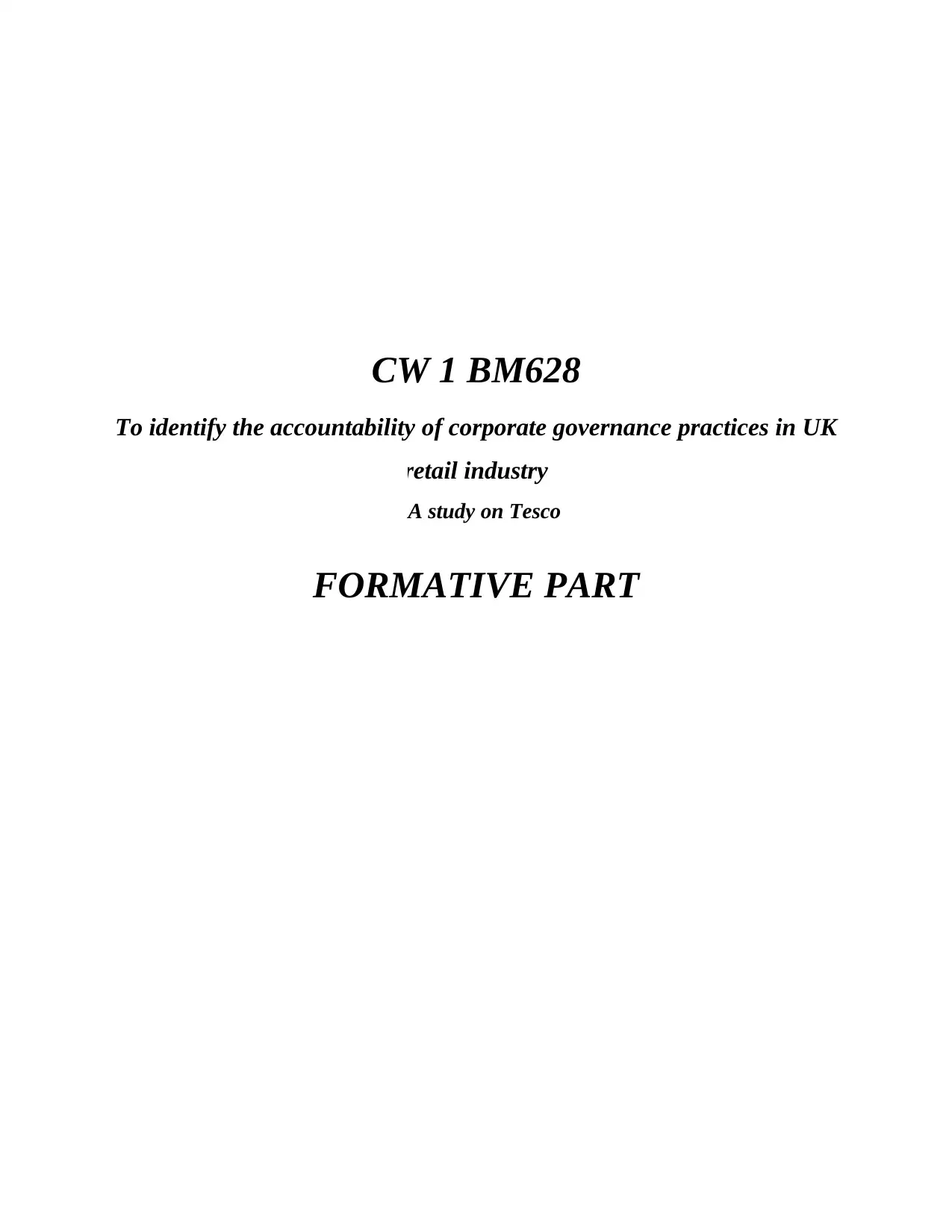
CW 1 BM628
To identify the accountability of corporate governance practices in UK
retail industry
A study on Tesco
FORMATIVE PART
To identify the accountability of corporate governance practices in UK
retail industry
A study on Tesco
FORMATIVE PART
Paraphrase This Document
Need a fresh take? Get an instant paraphrase of this document with our AI Paraphraser
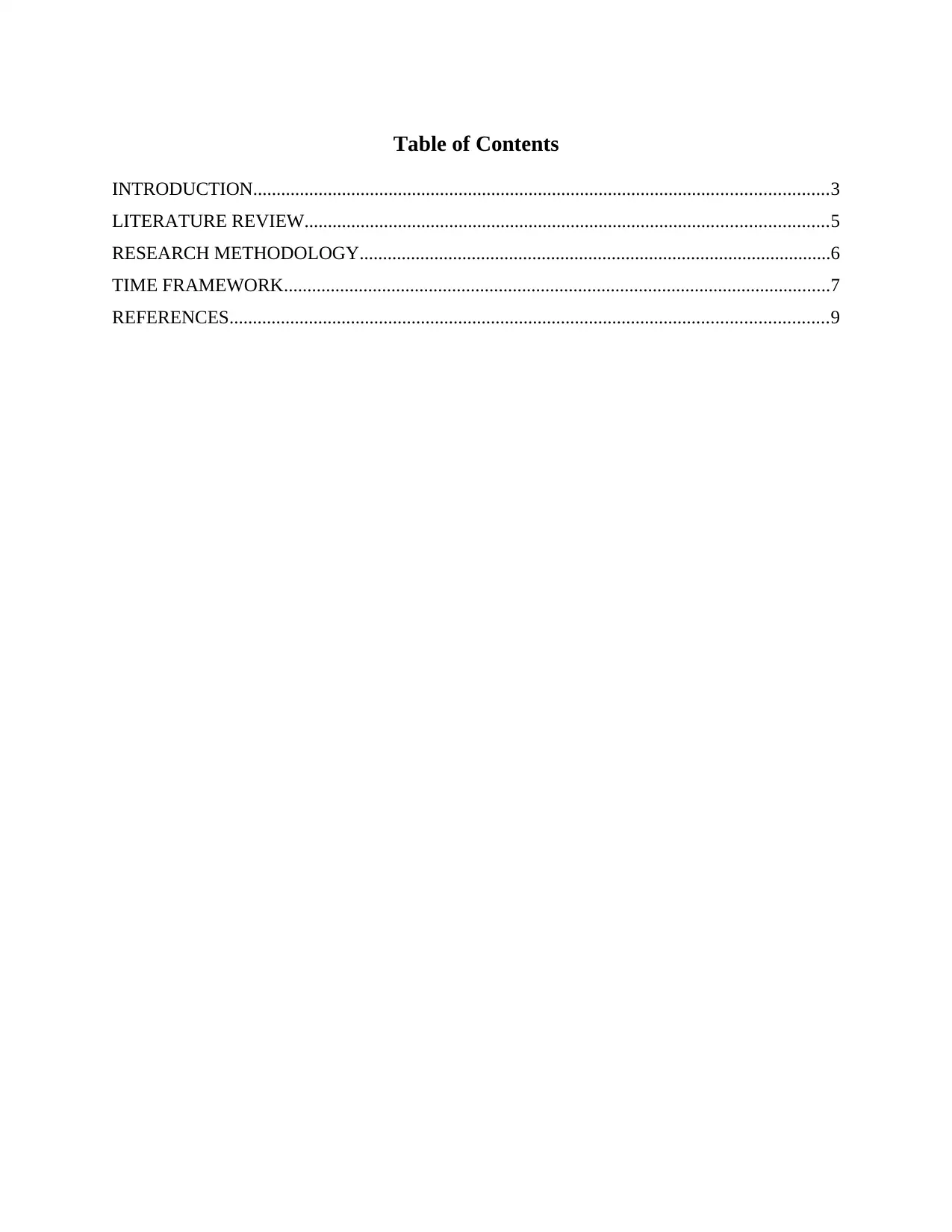
Table of Contents
INTRODUCTION...........................................................................................................................3
LITERATURE REVIEW................................................................................................................5
RESEARCH METHODOLOGY.....................................................................................................6
TIME FRAMEWORK.....................................................................................................................7
REFERENCES................................................................................................................................9
INTRODUCTION...........................................................................................................................3
LITERATURE REVIEW................................................................................................................5
RESEARCH METHODOLOGY.....................................................................................................6
TIME FRAMEWORK.....................................................................................................................7
REFERENCES................................................................................................................................9
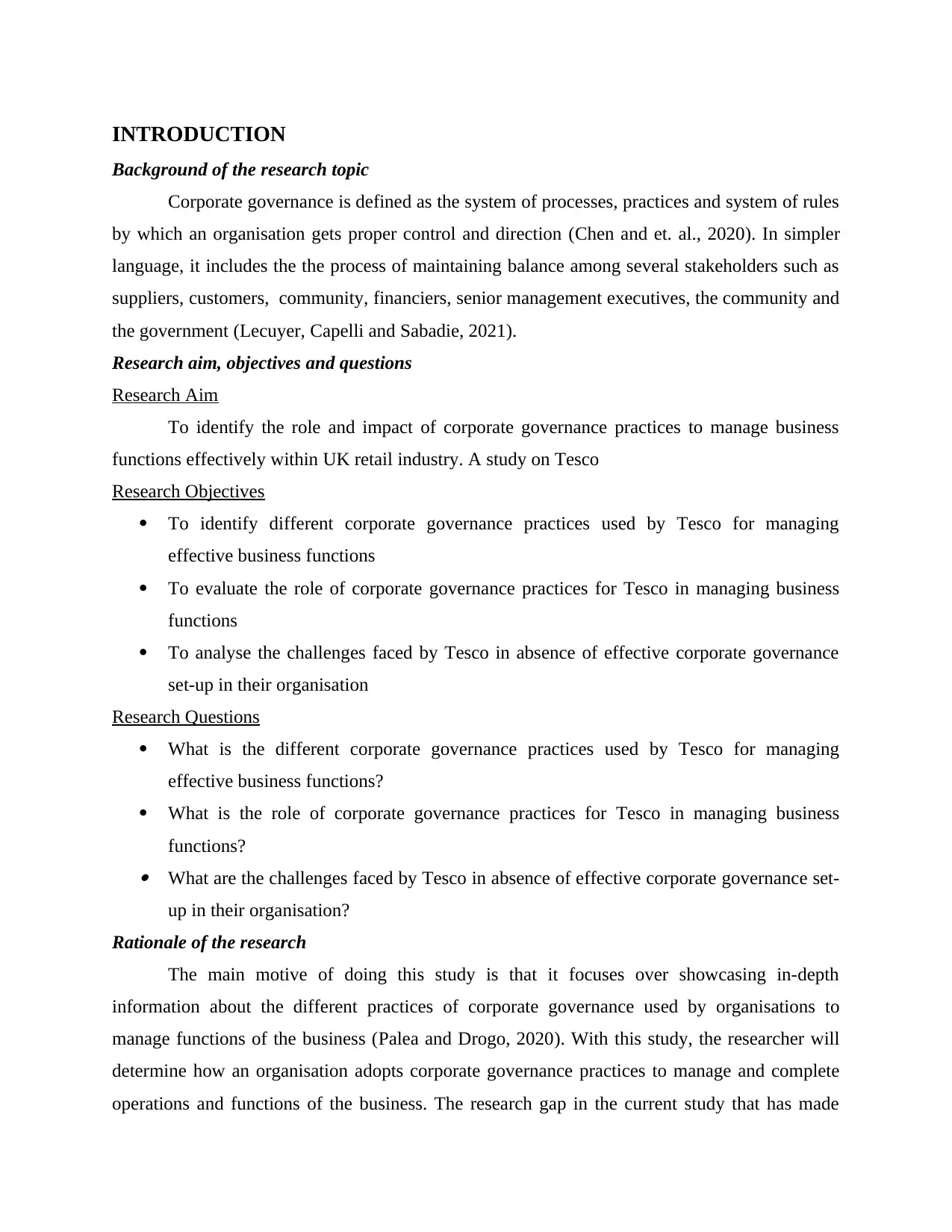
INTRODUCTION
Background of the research topic
Corporate governance is defined as the system of processes, practices and system of rules
by which an organisation gets proper control and direction (Chen and et. al., 2020). In simpler
language, it includes the the process of maintaining balance among several stakeholders such as
suppliers, customers, community, financiers, senior management executives, the community and
the government (Lecuyer, Capelli and Sabadie, 2021).
Research aim, objectives and questions
Research Aim
To identify the role and impact of corporate governance practices to manage business
functions effectively within UK retail industry. A study on Tesco
Research Objectives
To identify different corporate governance practices used by Tesco for managing
effective business functions
To evaluate the role of corporate governance practices for Tesco in managing business
functions
To analyse the challenges faced by Tesco in absence of effective corporate governance
set-up in their organisation
Research Questions
What is the different corporate governance practices used by Tesco for managing
effective business functions?
What is the role of corporate governance practices for Tesco in managing business
functions? What are the challenges faced by Tesco in absence of effective corporate governance set-
up in their organisation?
Rationale of the research
The main motive of doing this study is that it focuses over showcasing in-depth
information about the different practices of corporate governance used by organisations to
manage functions of the business (Palea and Drogo, 2020). With this study, the researcher will
determine how an organisation adopts corporate governance practices to manage and complete
operations and functions of the business. The research gap in the current study that has made
Background of the research topic
Corporate governance is defined as the system of processes, practices and system of rules
by which an organisation gets proper control and direction (Chen and et. al., 2020). In simpler
language, it includes the the process of maintaining balance among several stakeholders such as
suppliers, customers, community, financiers, senior management executives, the community and
the government (Lecuyer, Capelli and Sabadie, 2021).
Research aim, objectives and questions
Research Aim
To identify the role and impact of corporate governance practices to manage business
functions effectively within UK retail industry. A study on Tesco
Research Objectives
To identify different corporate governance practices used by Tesco for managing
effective business functions
To evaluate the role of corporate governance practices for Tesco in managing business
functions
To analyse the challenges faced by Tesco in absence of effective corporate governance
set-up in their organisation
Research Questions
What is the different corporate governance practices used by Tesco for managing
effective business functions?
What is the role of corporate governance practices for Tesco in managing business
functions? What are the challenges faced by Tesco in absence of effective corporate governance set-
up in their organisation?
Rationale of the research
The main motive of doing this study is that it focuses over showcasing in-depth
information about the different practices of corporate governance used by organisations to
manage functions of the business (Palea and Drogo, 2020). With this study, the researcher will
determine how an organisation adopts corporate governance practices to manage and complete
operations and functions of the business. The research gap in the current study that has made
⊘ This is a preview!⊘
Do you want full access?
Subscribe today to unlock all pages.

Trusted by 1+ million students worldwide
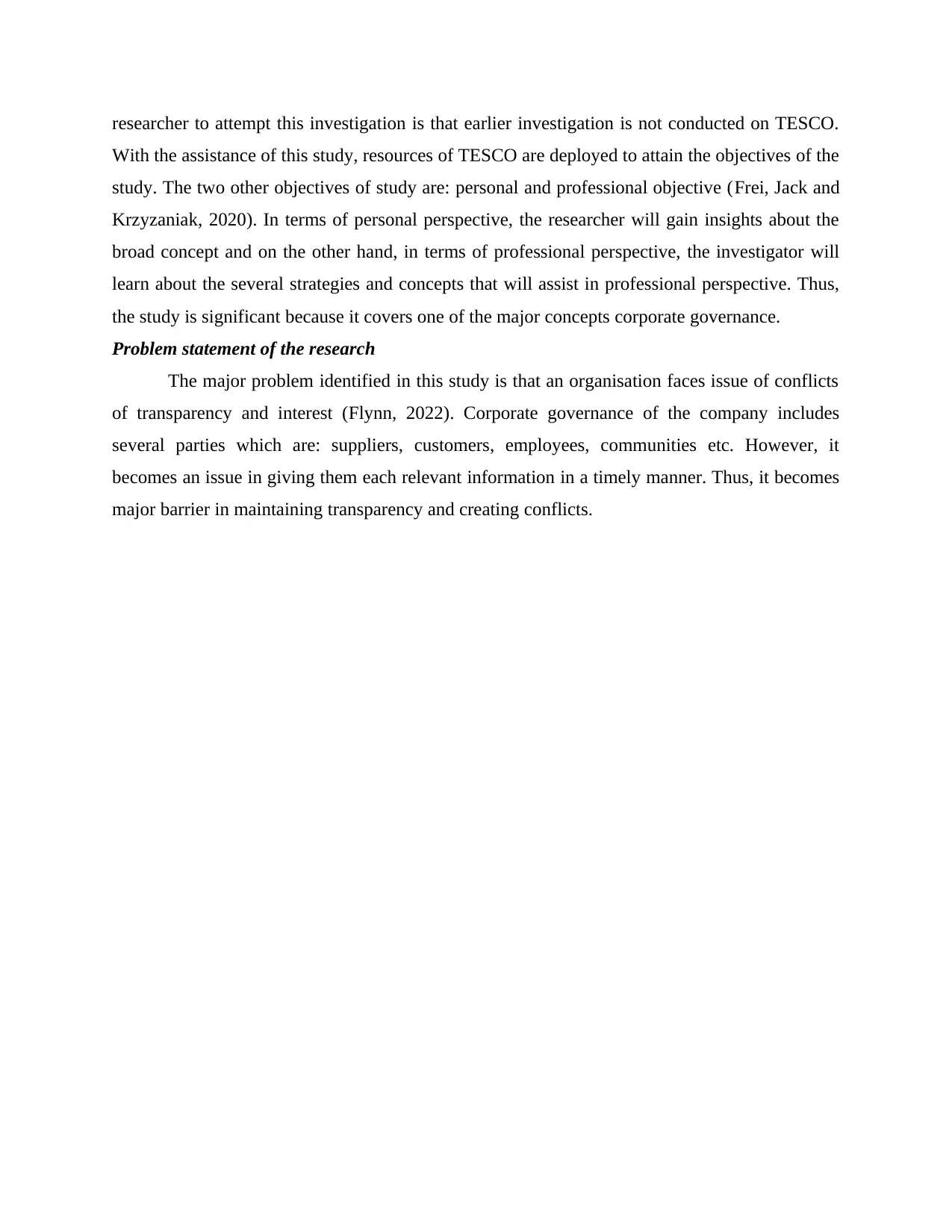
researcher to attempt this investigation is that earlier investigation is not conducted on TESCO.
With the assistance of this study, resources of TESCO are deployed to attain the objectives of the
study. The two other objectives of study are: personal and professional objective (Frei, Jack and
Krzyzaniak, 2020). In terms of personal perspective, the researcher will gain insights about the
broad concept and on the other hand, in terms of professional perspective, the investigator will
learn about the several strategies and concepts that will assist in professional perspective. Thus,
the study is significant because it covers one of the major concepts corporate governance.
Problem statement of the research
The major problem identified in this study is that an organisation faces issue of conflicts
of transparency and interest (Flynn, 2022). Corporate governance of the company includes
several parties which are: suppliers, customers, employees, communities etc. However, it
becomes an issue in giving them each relevant information in a timely manner. Thus, it becomes
major barrier in maintaining transparency and creating conflicts.
With the assistance of this study, resources of TESCO are deployed to attain the objectives of the
study. The two other objectives of study are: personal and professional objective (Frei, Jack and
Krzyzaniak, 2020). In terms of personal perspective, the researcher will gain insights about the
broad concept and on the other hand, in terms of professional perspective, the investigator will
learn about the several strategies and concepts that will assist in professional perspective. Thus,
the study is significant because it covers one of the major concepts corporate governance.
Problem statement of the research
The major problem identified in this study is that an organisation faces issue of conflicts
of transparency and interest (Flynn, 2022). Corporate governance of the company includes
several parties which are: suppliers, customers, employees, communities etc. However, it
becomes an issue in giving them each relevant information in a timely manner. Thus, it becomes
major barrier in maintaining transparency and creating conflicts.
Paraphrase This Document
Need a fresh take? Get an instant paraphrase of this document with our AI Paraphraser
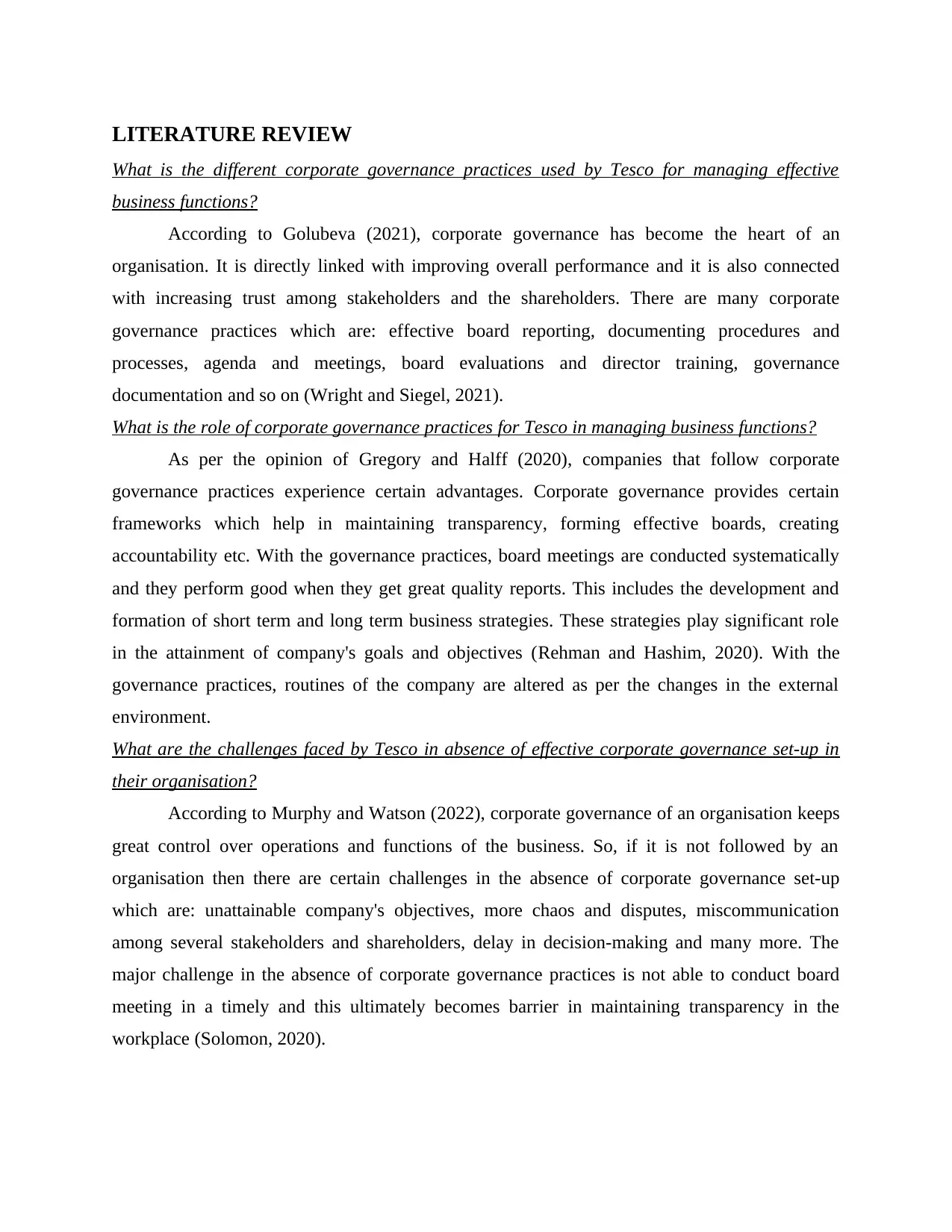
LITERATURE REVIEW
What is the different corporate governance practices used by Tesco for managing effective
business functions?
According to Golubeva (2021), corporate governance has become the heart of an
organisation. It is directly linked with improving overall performance and it is also connected
with increasing trust among stakeholders and the shareholders. There are many corporate
governance practices which are: effective board reporting, documenting procedures and
processes, agenda and meetings, board evaluations and director training, governance
documentation and so on (Wright and Siegel, 2021).
What is the role of corporate governance practices for Tesco in managing business functions?
As per the opinion of Gregory and Halff (2020), companies that follow corporate
governance practices experience certain advantages. Corporate governance provides certain
frameworks which help in maintaining transparency, forming effective boards, creating
accountability etc. With the governance practices, board meetings are conducted systematically
and they perform good when they get great quality reports. This includes the development and
formation of short term and long term business strategies. These strategies play significant role
in the attainment of company's goals and objectives (Rehman and Hashim, 2020). With the
governance practices, routines of the company are altered as per the changes in the external
environment.
What are the challenges faced by Tesco in absence of effective corporate governance set-up in
their organisation?
According to Murphy and Watson (2022), corporate governance of an organisation keeps
great control over operations and functions of the business. So, if it is not followed by an
organisation then there are certain challenges in the absence of corporate governance set-up
which are: unattainable company's objectives, more chaos and disputes, miscommunication
among several stakeholders and shareholders, delay in decision-making and many more. The
major challenge in the absence of corporate governance practices is not able to conduct board
meeting in a timely and this ultimately becomes barrier in maintaining transparency in the
workplace (Solomon, 2020).
What is the different corporate governance practices used by Tesco for managing effective
business functions?
According to Golubeva (2021), corporate governance has become the heart of an
organisation. It is directly linked with improving overall performance and it is also connected
with increasing trust among stakeholders and the shareholders. There are many corporate
governance practices which are: effective board reporting, documenting procedures and
processes, agenda and meetings, board evaluations and director training, governance
documentation and so on (Wright and Siegel, 2021).
What is the role of corporate governance practices for Tesco in managing business functions?
As per the opinion of Gregory and Halff (2020), companies that follow corporate
governance practices experience certain advantages. Corporate governance provides certain
frameworks which help in maintaining transparency, forming effective boards, creating
accountability etc. With the governance practices, board meetings are conducted systematically
and they perform good when they get great quality reports. This includes the development and
formation of short term and long term business strategies. These strategies play significant role
in the attainment of company's goals and objectives (Rehman and Hashim, 2020). With the
governance practices, routines of the company are altered as per the changes in the external
environment.
What are the challenges faced by Tesco in absence of effective corporate governance set-up in
their organisation?
According to Murphy and Watson (2022), corporate governance of an organisation keeps
great control over operations and functions of the business. So, if it is not followed by an
organisation then there are certain challenges in the absence of corporate governance set-up
which are: unattainable company's objectives, more chaos and disputes, miscommunication
among several stakeholders and shareholders, delay in decision-making and many more. The
major challenge in the absence of corporate governance practices is not able to conduct board
meeting in a timely and this ultimately becomes barrier in maintaining transparency in the
workplace (Solomon, 2020).
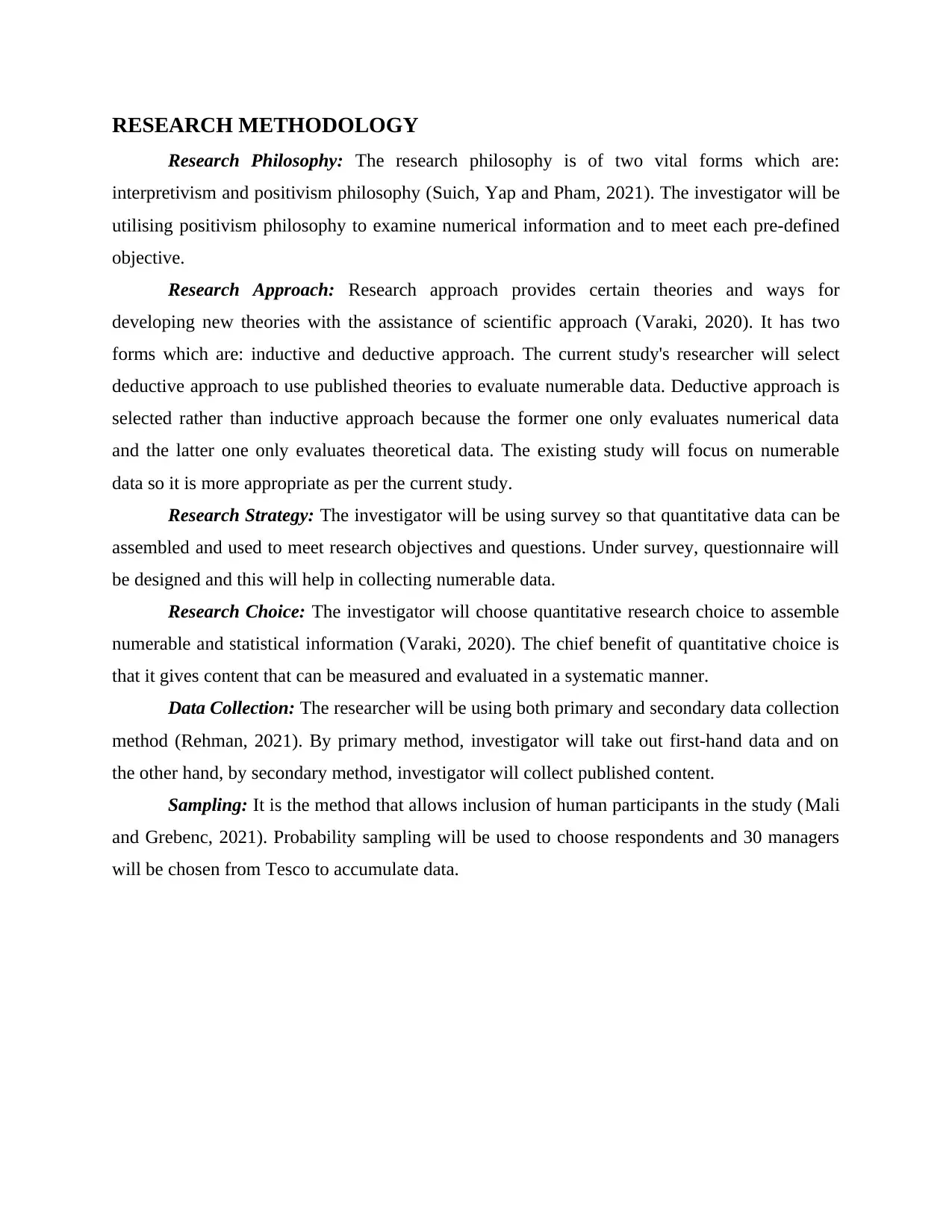
RESEARCH METHODOLOGY
Research Philosophy: The research philosophy is of two vital forms which are:
interpretivism and positivism philosophy (Suich, Yap and Pham, 2021). The investigator will be
utilising positivism philosophy to examine numerical information and to meet each pre-defined
objective.
Research Approach: Research approach provides certain theories and ways for
developing new theories with the assistance of scientific approach (Varaki, 2020). It has two
forms which are: inductive and deductive approach. The current study's researcher will select
deductive approach to use published theories to evaluate numerable data. Deductive approach is
selected rather than inductive approach because the former one only evaluates numerical data
and the latter one only evaluates theoretical data. The existing study will focus on numerable
data so it is more appropriate as per the current study.
Research Strategy: The investigator will be using survey so that quantitative data can be
assembled and used to meet research objectives and questions. Under survey, questionnaire will
be designed and this will help in collecting numerable data.
Research Choice: The investigator will choose quantitative research choice to assemble
numerable and statistical information (Varaki, 2020). The chief benefit of quantitative choice is
that it gives content that can be measured and evaluated in a systematic manner.
Data Collection: The researcher will be using both primary and secondary data collection
method (Rehman, 2021). By primary method, investigator will take out first-hand data and on
the other hand, by secondary method, investigator will collect published content.
Sampling: It is the method that allows inclusion of human participants in the study (Mali
and Grebenc, 2021). Probability sampling will be used to choose respondents and 30 managers
will be chosen from Tesco to accumulate data.
Research Philosophy: The research philosophy is of two vital forms which are:
interpretivism and positivism philosophy (Suich, Yap and Pham, 2021). The investigator will be
utilising positivism philosophy to examine numerical information and to meet each pre-defined
objective.
Research Approach: Research approach provides certain theories and ways for
developing new theories with the assistance of scientific approach (Varaki, 2020). It has two
forms which are: inductive and deductive approach. The current study's researcher will select
deductive approach to use published theories to evaluate numerable data. Deductive approach is
selected rather than inductive approach because the former one only evaluates numerical data
and the latter one only evaluates theoretical data. The existing study will focus on numerable
data so it is more appropriate as per the current study.
Research Strategy: The investigator will be using survey so that quantitative data can be
assembled and used to meet research objectives and questions. Under survey, questionnaire will
be designed and this will help in collecting numerable data.
Research Choice: The investigator will choose quantitative research choice to assemble
numerable and statistical information (Varaki, 2020). The chief benefit of quantitative choice is
that it gives content that can be measured and evaluated in a systematic manner.
Data Collection: The researcher will be using both primary and secondary data collection
method (Rehman, 2021). By primary method, investigator will take out first-hand data and on
the other hand, by secondary method, investigator will collect published content.
Sampling: It is the method that allows inclusion of human participants in the study (Mali
and Grebenc, 2021). Probability sampling will be used to choose respondents and 30 managers
will be chosen from Tesco to accumulate data.
⊘ This is a preview!⊘
Do you want full access?
Subscribe today to unlock all pages.

Trusted by 1+ million students worldwide
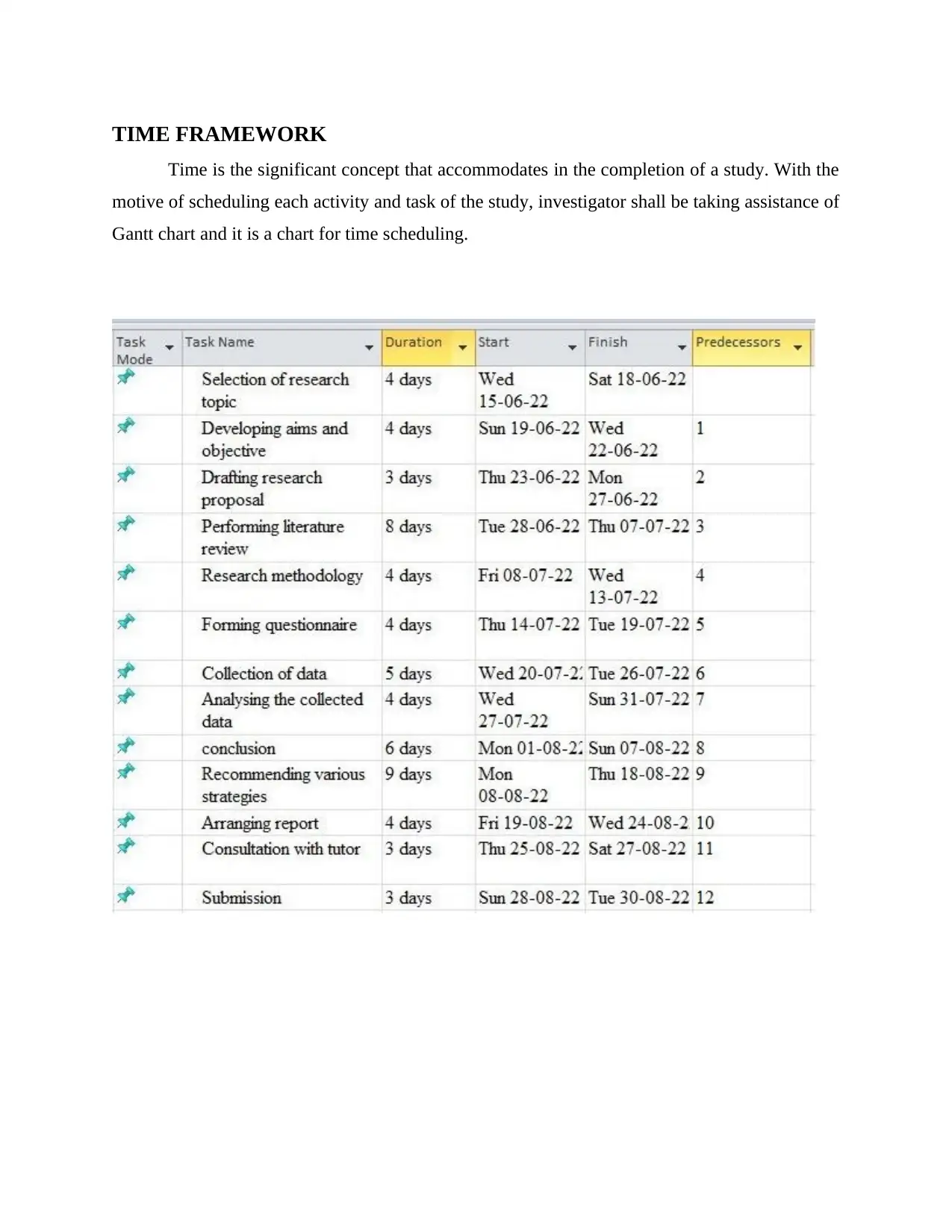
TIME FRAMEWORK
Time is the significant concept that accommodates in the completion of a study. With the
motive of scheduling each activity and task of the study, investigator shall be taking assistance of
Gantt chart and it is a chart for time scheduling.
Time is the significant concept that accommodates in the completion of a study. With the
motive of scheduling each activity and task of the study, investigator shall be taking assistance of
Gantt chart and it is a chart for time scheduling.
Paraphrase This Document
Need a fresh take? Get an instant paraphrase of this document with our AI Paraphraser

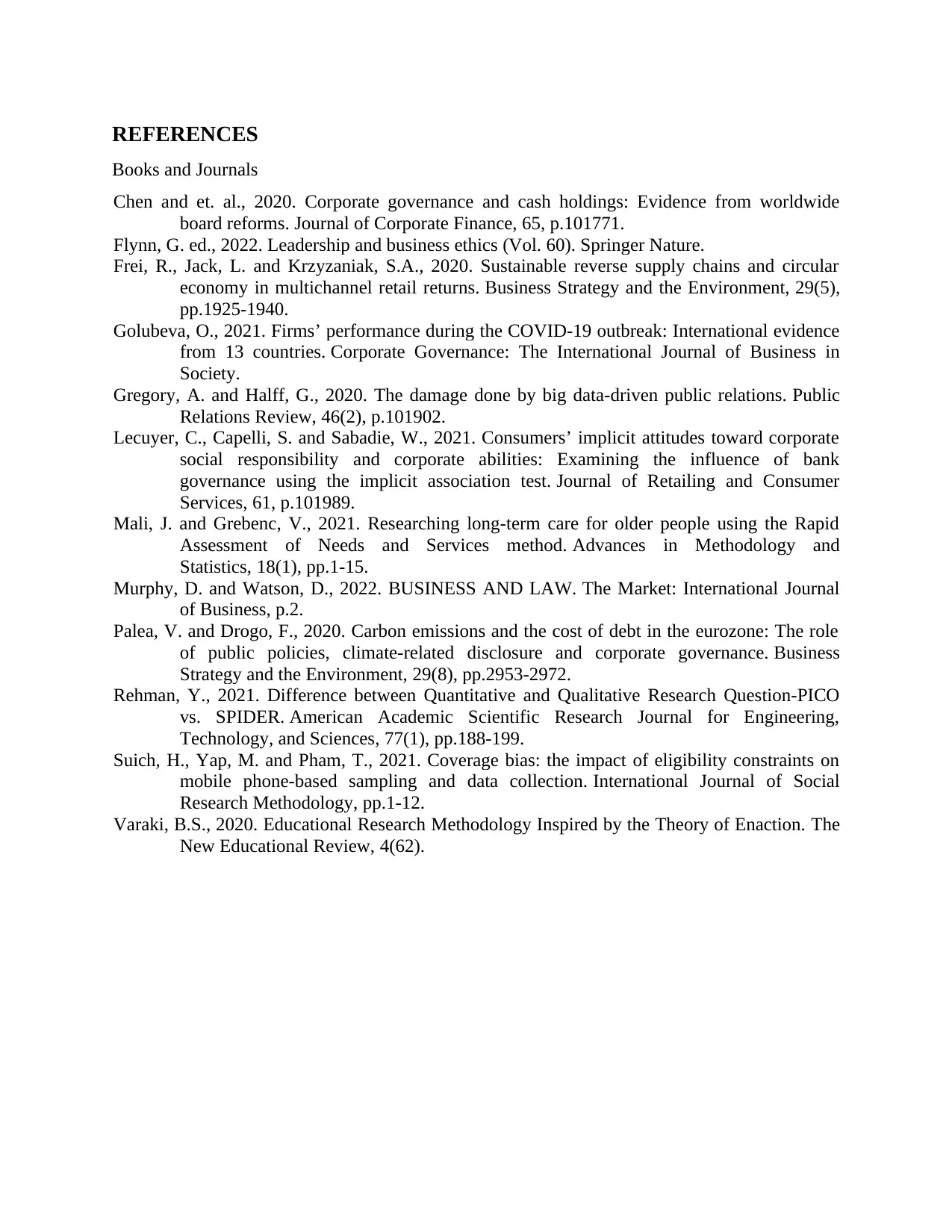
REFERENCES
Books and Journals
Chen and et. al., 2020. Corporate governance and cash holdings: Evidence from worldwide
board reforms. Journal of Corporate Finance, 65, p.101771.
Flynn, G. ed., 2022. Leadership and business ethics (Vol. 60). Springer Nature.
Frei, R., Jack, L. and Krzyzaniak, S.A., 2020. Sustainable reverse supply chains and circular
economy in multichannel retail returns. Business Strategy and the Environment, 29(5),
pp.1925-1940.
Golubeva, O., 2021. Firms’ performance during the COVID-19 outbreak: International evidence
from 13 countries. Corporate Governance: The International Journal of Business in
Society.
Gregory, A. and Halff, G., 2020. The damage done by big data-driven public relations. Public
Relations Review, 46(2), p.101902.
Lecuyer, C., Capelli, S. and Sabadie, W., 2021. Consumers’ implicit attitudes toward corporate
social responsibility and corporate abilities: Examining the influence of bank
governance using the implicit association test. Journal of Retailing and Consumer
Services, 61, p.101989.
Mali, J. and Grebenc, V., 2021. Researching long-term care for older people using the Rapid
Assessment of Needs and Services method. Advances in Methodology and
Statistics, 18(1), pp.1-15.
Murphy, D. and Watson, D., 2022. BUSINESS AND LAW. The Market: International Journal
of Business, p.2.
Palea, V. and Drogo, F., 2020. Carbon emissions and the cost of debt in the eurozone: The role
of public policies, climate‐related disclosure and corporate governance. Business
Strategy and the Environment, 29(8), pp.2953-2972.
Rehman, Y., 2021. Difference between Quantitative and Qualitative Research Question-PICO
vs. SPIDER. American Academic Scientific Research Journal for Engineering,
Technology, and Sciences, 77(1), pp.188-199.
Suich, H., Yap, M. and Pham, T., 2021. Coverage bias: the impact of eligibility constraints on
mobile phone-based sampling and data collection. International Journal of Social
Research Methodology, pp.1-12.
Varaki, B.S., 2020. Educational Research Methodology Inspired by the Theory of Enaction. The
New Educational Review, 4(62).
Books and Journals
Chen and et. al., 2020. Corporate governance and cash holdings: Evidence from worldwide
board reforms. Journal of Corporate Finance, 65, p.101771.
Flynn, G. ed., 2022. Leadership and business ethics (Vol. 60). Springer Nature.
Frei, R., Jack, L. and Krzyzaniak, S.A., 2020. Sustainable reverse supply chains and circular
economy in multichannel retail returns. Business Strategy and the Environment, 29(5),
pp.1925-1940.
Golubeva, O., 2021. Firms’ performance during the COVID-19 outbreak: International evidence
from 13 countries. Corporate Governance: The International Journal of Business in
Society.
Gregory, A. and Halff, G., 2020. The damage done by big data-driven public relations. Public
Relations Review, 46(2), p.101902.
Lecuyer, C., Capelli, S. and Sabadie, W., 2021. Consumers’ implicit attitudes toward corporate
social responsibility and corporate abilities: Examining the influence of bank
governance using the implicit association test. Journal of Retailing and Consumer
Services, 61, p.101989.
Mali, J. and Grebenc, V., 2021. Researching long-term care for older people using the Rapid
Assessment of Needs and Services method. Advances in Methodology and
Statistics, 18(1), pp.1-15.
Murphy, D. and Watson, D., 2022. BUSINESS AND LAW. The Market: International Journal
of Business, p.2.
Palea, V. and Drogo, F., 2020. Carbon emissions and the cost of debt in the eurozone: The role
of public policies, climate‐related disclosure and corporate governance. Business
Strategy and the Environment, 29(8), pp.2953-2972.
Rehman, Y., 2021. Difference between Quantitative and Qualitative Research Question-PICO
vs. SPIDER. American Academic Scientific Research Journal for Engineering,
Technology, and Sciences, 77(1), pp.188-199.
Suich, H., Yap, M. and Pham, T., 2021. Coverage bias: the impact of eligibility constraints on
mobile phone-based sampling and data collection. International Journal of Social
Research Methodology, pp.1-12.
Varaki, B.S., 2020. Educational Research Methodology Inspired by the Theory of Enaction. The
New Educational Review, 4(62).
⊘ This is a preview!⊘
Do you want full access?
Subscribe today to unlock all pages.

Trusted by 1+ million students worldwide
1 out of 9
Related Documents
Your All-in-One AI-Powered Toolkit for Academic Success.
+13062052269
info@desklib.com
Available 24*7 on WhatsApp / Email
![[object Object]](/_next/static/media/star-bottom.7253800d.svg)
Unlock your academic potential
Copyright © 2020–2026 A2Z Services. All Rights Reserved. Developed and managed by ZUCOL.





